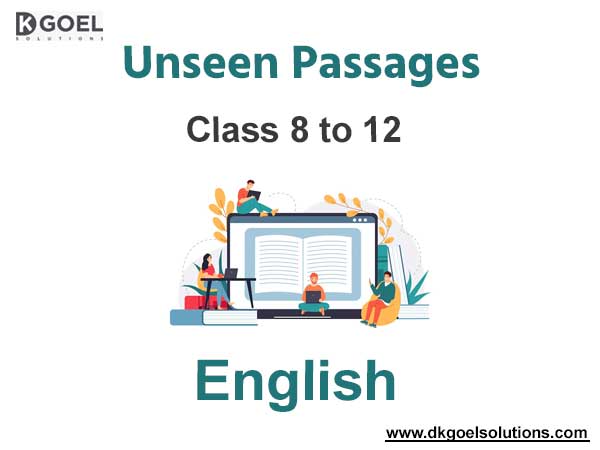Unseen Passage
The word comprehension means ‘understanding’. The unseen passage for classes 3 to 12 set in the examination aims at testing one understanding of it. It requires a constant habit of reading CBSE Unseen Passage. Reading Comprehension Questions and Answers are the most high-scoring element of competitive tests’ verbal ability section, but they’re also the most difficult. The most important task in a passage of comprehension is to identify the main points of a text and understand the relation between the parts of the passage. These passages generally include a variety of questions like multiple-choice questions (MCQs), cloze or gap-filling, sentence completion, table completion, very short answer type and vocabulary-based questions.
Unseen Passages with Solutions
| Unseen Passages for Class 12 |
| Unseen Passages for Class 11 |
| Unseen Passages for Class 10 |
| Unseen Passages for Class 9 |
| Unseen Passages for Class 8 |

Importance of Comprehension of unseen passages
It accounts for around a quarter of the exam’s total marks. As a result, students who wish to do well in English must prepare for the exam by practicing the comprehension passage. We have supplied the CBSE Unseen Passage English to assist students in their preparation. Students must read them and answer the questions based on these comprehension passages. As a result, applicants to these exams must thoroughly practice reading comprehension questions and answers in order to achieve expertise and correctly answer questions, which will increase their marks.
Tips to Read well:
How well you understand a comprehension passage depends on how well you read it. In order to attempt this question, one has to be a good reader. Reading comprehension refers to the capacity to actively read and digest information in order to answer a series of questions. Candidates can refer to the Reading Comprehension website for vital hints on how to approach RC passage questions as well as information on the various types of RC passage questions that will be asked on the test.
The following points may develop one’s good reading ability.
1. Read the passage silently and as quickly as you can.
2. Don’t concentrate on single Words. Try to read words in groups for meaning such as: Once upon a time. The Gateway of India’ etc.
3. Avoid moving a pen or pencil or the index finger along with the text as it will only slow down your reading. Also don’t move your head from one side of the text to the other. Instead, move your eyes only.
4. In case of a difficult word, try to guess its meaning from the context. Looking up the dictionary for the meanings of all the difficult words is useful during practice but not practicable in the examination.
5. Try to understand what the writer intends to say.
6. You may require changing the form of a word or words, a phrase, and the structure or grammar of the answer such that it suits the grammar of the question, statement, or a blank in a given passage.
7. Re-read the passage slowly to have a full understanding of the passage.
The Reading Section has three texts: Factual, Discursive & Literary.
1. Factual Text involves a straightforward account of factual information e.g. instructions, description, report, etc. These may be extracts taken from newspapers, magazines, tourist guide books, books on historical social facts, etc.
2. Discursive Text considers issues from different angles and involves opinion e.g. argumentative, persuasive, or interpretative. It proceeds by arguments and reasoning and is not intuitive.
3. Literary Text can be a short story, poem, essay, novel, play, biography, etc. It may be complete.
